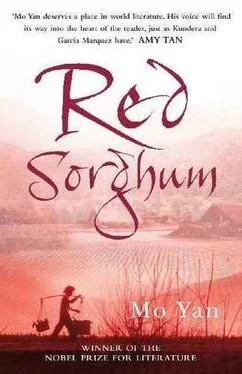Twenty days earlier, Father had gone with Granddad to dig up Grandma’s grave. It was definitely not a good day for swallows, for a dozen sodden clouds, like torn cotton wadding, hung in the low sky, reeking like rotting fish and spoiled shrimp. An ill wind carried a stream of sinister air down the Black Water River, along whose banks the corpses of dogs shattered by muskmelon grenades during the battle with humans the previous winter lay decomposing amid the sallow water grass; swallows migrating north from Hainan Island flew across the river with dread, as frogs below began their mating ritual, gaunt bodies caught up in the passions of love following a winter of hibernation.
Father stood with Granddad and nineteen Iron Society soldiers, all carrying hoes and pickaxes, at the head of Grandma’s grave. Golden flowers of bitterweed, the first of the year, dotted the faded black earth of the column of mounds.
Three minutes of silence.
‘Douguan, you’re sure this is the one?’ Granddad asked.
‘It’s this one,’ Father replied. ‘I could never forget.’
‘Okay,’ Granddad said. ‘Start digging!’
The Iron Society soldiers raised their tools, but were reluctant to start. So Granddad took a pickaxe from one of them, aimed at the mound, which arched up like a woman’s breast, and swung with all his might, to bury the tool in the soil with a heavy thud. He then pulled it towards him, scooping out a chunk of the black earth.
Father’s heart knotted up as the pickaxe split the grave mound, and at that instant he experienced fear and loathing for Granddad’s ruthlessness.
‘Dig it up,’ Granddad said feebly.
Forming a ring around Grandma’s grave, the soldiers began to chop and dig, levelling the mound in no time. Father’s thoughts returned to the night of the ninth day of the eighth lunar month, 1939, when they had buried Grandma. Fires raging on the bridge and torches ringing her body had illuminated her dead face, nearly bringing it back to life, before it was swallowed up by the black earth. Now the likeness was being dug up again, and Father grew tense as the layers were pared away, until he thought he saw Grandma’s smile as she kissed death through the earth separating them.
The Iron Society soldiers stopped digging when the final layer of soil covering the sorghum was removed and cast pleading looks at Granddad and Father, who saw their noses twitch as the overpowering stench of decay rose from the grave. To Father, who breathed in greedily, it was the odour of the milk he’d suckled at Grandma’s breast.
‘Clear it away!’ Granddad ordered, his black eyes devoid of pity. ‘Clear it away!’
Reluctantly they bent down and began pulling the sorghum out of the grave. Transparent drops of water oozed from the naked stalks, turned by decay into the glossy red of moist jade.
Deeper and deeper they went, the stench growing stronger. But to Father it was the rich aroma of sorghum wine, intoxicating, dizzying. He wanted to see Grandma as soon as possible, but the prospect also frightened him. The sorghum covering grew ever thinner, yet he felt the distance between him and Grandma increase. The final layer of stalks suddenly rustled loudly, wrenching shouts of alarm from some of the soldiers and striking others dumb with fear. Their faces were ashen, and only Granddad’s insistence gave them the courage to peek down into the grave.
Father watched as four brown field voles scrambled up the sides of the unearthed grave, while a fifth one, pure white, squatted on a supremely beautiful sorghum stalk in the middle of the grave. Everyone stared at the brown voles as they scampered away; meanwhile, the white one perched haughtily without stirring, staring back with its tiny, jet-black eyes. Father picked up a clod of earth and hurled it into the grave. The vole sprang two feet into the air, fell back, and scurried madly around the edges. With loathing swelling their insides, the soldiers rained clods of earth down on the white vole until it lay smashed in the middle of the grave.
According to Father, Grandma emerged from the resplendent, aromatic grave as lovely as a flower, as in a fairy tale. But the faces of the Iron Society soldiers contorted whenever they described in gory detail the hideous shape of her corpse and the suffocating stench issuing from the grave. Father called them liars. His senses were particularly keen at the time, he recalled, and as the last few stalks were removed, Grandma’s sweet, beautiful smile made the area crackle as though swept by a raging fire. His only regret was how fleeting the moment had been. For, when Grandma’s body was lifted out of the grave, her lustrous beauty and delicate fragrance turned into a mist and floated gently away, leaving behind only a white skeleton.
After lifting the body out of the grave, the soldiers ran down to the bank of the Black Water River and vomited dark-green bile into the dark-green water. Granddad spread out a piece of white cloth and told Father to help him lift Grandma’s skeleton onto it. Infected by the sound of vomiting in the river, Father felt a spasm in his neck, and hacking sounds erupted from his throat. He hated the thought of touching the pale-white bones.
‘Douguan,’ Granddad said, ‘you don’t think your own mom’s bones are too dirty to touch, do you? Not you!’
Moved by the rare tragic look on Granddad’s face, Father bent down and tentatively reached out to touch Grandma’s pale leg bone, which was so icy it froze his guts. Granddad tried to lift the skeleton by the shoulder blades, but it disintegrated and landed in a heap on the ground. A pair of red ants crawled in the sockets that had once been home to Grandma’s limpid eyes, their antennae vibrating. Father threw down Grandma’s leg bone, turned tail, and ran, filling the air with howls of grief.
AT NOON, THE funeral master announced loudly, ‘Begin the procession,’ and mourners swept into the fields like a human tide, followed by the Yu family bier, moving slowly towards them like a floating iceberg. Large open tents in which sumptuous road offerings were displayed had been placed on both sides of the road every couple of hundred yards. Cavalry troops led by Five Troubles formed a guard on either side of the road, galloping round and round.
A fat monk in a yellow robe, his left shoulder and arm exposed, led the procession with a halberd from which chimes hung, twinkling as it spun around his body, sometimes flying up in the air towards the onlookers. At least half the onlookers recognised him as the pauper monk from the Tianqi Temple who never burned incense and never chanted the Buddha’s name, preferring to drink great bowlfuls of wine and boldly partake of meat and fish. He kept a skinny yet uncommonly fertile little woman, who presented him with a whole brood of little monks. He opened a passage through the crowds by flinging his halberd at their heads, his face beaming.
An Iron Society soldier followed, holding a long pole with a spirit-calling banner woven from thirty-two white strips of paper, one for each of Grandma’s years; it fluttered and snapped, though there wasn’t a breath of wind. Then came the banner of honour, held ten feet in the air by a strapping young Iron Society soldier, its white silk ornamented with large black letters:
Casket of the Woman Dai, 32-Year-Old Wife of Yu Zhan’ao, Guerrilla Commander of Northeast Gaomi Township, Republic of China.
Behind the banner of honour came the lesser canopy, in which Grandma’s spirit tablet lay, and behind that, the great canopy encasing her coffin. Sixty-four Iron Society soldiers marched in perfect cadence to the mournful strains of the funeral music. Father, white mourning hood over his head and shoulders, a willow grief-stick in his hand, was being carried by two Iron Society soldiers. His desolate wails were the standard dry variety — his eyes were dry, and blank. Thunder with no rain. This sort of dry wailing was more moving than tearful shrieks, and many of the onlookers were deeply touched by his performance.
Читать дальше












